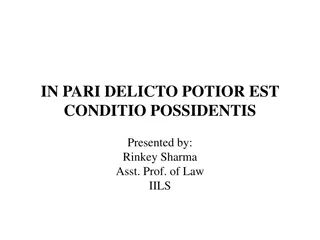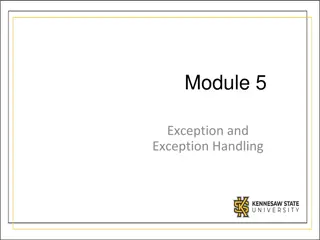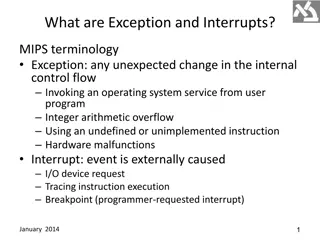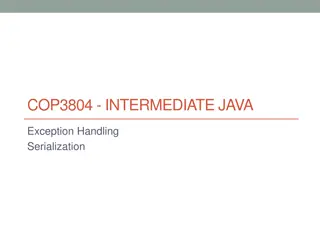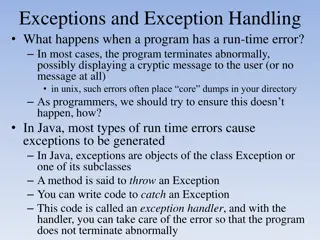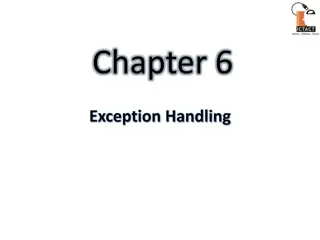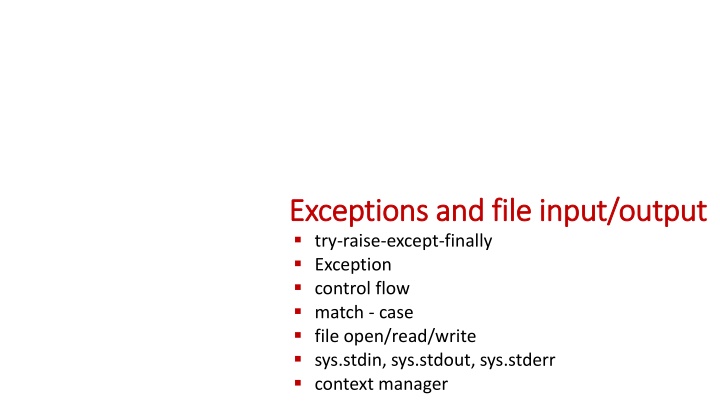
Error Handling Techniques and Control Flow in Python
Learn about error handling techniques, control flow, and built-in exceptions in Python programming. Understand how to handle runtime errors efficiently and use exceptions as a control flow mechanism. Discover how to break in a recursive function and effectively manage errors in your Python codebase.
Download Presentation

Please find below an Image/Link to download the presentation.
The content on the website is provided AS IS for your information and personal use only. It may not be sold, licensed, or shared on other websites without obtaining consent from the author. If you encounter any issues during the download, it is possible that the publisher has removed the file from their server.
You are allowed to download the files provided on this website for personal or commercial use, subject to the condition that they are used lawfully. All files are the property of their respective owners.
The content on the website is provided AS IS for your information and personal use only. It may not be sold, licensed, or shared on other websites without obtaining consent from the author.
E N D
Presentation Transcript
Exceptions Exceptions and file input/output and file input/output try-raise-except-finally Exception control flow match - case file open/read/write sys.stdin, sys.stdout, sys.stderr context manager
Exceptions Exceptions Error Error handling and handling and control control flow flow Exceptions is a widespread technique to handle run-time errors / abnormal behaviour (e.g. in Python, Java, C++, JavaScript, C#) Exceptions can also be used as an advanced control flow mechanism (e.g. in Python, Java, JavaScript) Problem: How to perform a break in a recursive function ?
| +-- OSError | +-- BlockingIOError | +-- ChildProcessError | +-- ConnectionError | | +-- BrokenPipeError | | +-- ConnectionAbortedError | | +-- ConnectionRefusedError | | +-- ConnectionResetError | +-- FileExistsError | +-- FileNotFoundError | +-- InterruptedError | +-- IsADirectoryError | +-- NotADirectoryError | +-- PermissionError | +-- ProcessLookupError | +-- TimeoutError +-- ReferenceError +-- RuntimeError | +-- NotImplementedError | +-- RecursionError +-- SyntaxError | +-- IndentationError | +-- TabError +-- SystemError +-- Warning +-- DeprecationWarning +-- PendingDeprecationWarning +-- RuntimeWarning +-- SyntaxWarning +-- UserWarning +-- FutureWarning +-- ImportWarning +-- UnicodeWarning +-- BytesWarning +-- ResourceWarning Built Built- -in in exceptions exceptions ( (class class hierarchy hierarchy) ) BaseException +-- SystemExit +-- KeyboardInterrupt +-- GeneratorExit +-- Exception +-- StopIteration +-- StopAsyncIteration +-- ArithmeticError | +-- FloatingPointError | +-- OverflowError | +-- ZeroDivisionError +-- AssertionError +-- AttributeError +-- BufferError +-- EOFError +-- ImportError | +-- ModuleNotFoundError +-- LookupError | +-- IndexError | +-- KeyError +-- MemoryError +-- NameError | +-- UnboundLocalError +-- TypeError +-- ValueError | +-- UnicodeError | +-- UnicodeDecodeError | +-- UnicodeEncodeError | +-- UnicodeTranslateError docs.python.org/3/library/exceptions.html
Typical Typical built built- -in exceptions exceptions Python shell > 7 / 0 | ZeroDivisionError: division by zero > int('42x') | ValueError: invalid literal for int() with base 10: '42x' > x = y | NameError: name 'y' is not defined > L = [1] * 10_000_000_000 | MemoryError > 2.5 ** 1000 | OverflowError: (34, 'Result too large') > t = (3, 4) > t[0] = 7 | TypeError: 'tuple' object does not support item assignment > t[3] | IndexError: tuple index out of range > t.x | AttributeError: 'tuple' object has no attribute 'x' > x = {} > x['foo'] | KeyError: 'foo' > def f(x): f(x + 1) > f(0) | RecursionError: maximum recursion depth exceeded > def f(): x = x + 1 > f() | UnboundLocalError: local variable 'x' referenced before assignment in and and unhandled unhandled behaviour behaviour
Catching Catching exceptions exceptions Fractions Fractions (I) (I) fraction1.py while True: numerator = int(input('Numerator = ')) denominator = int(input('Denominator = ')) result = numerator / denominator print(f'{numerator} / {denominator} = {result}') Python shell | Numerator = 10 | Denominator = 3 | 10 / 3 = 3.3333333333333335 | Numerator = 20 | Denominator = 0 | ZeroDivisionError: division by zero >
Catching Catching exceptions exceptions Fractions Fractions (II) (II) fraction2.py while True: numerator = int(input('Numerator = ')) denominator = int(input('Denominator = ')) try: result = numerator / denominator except ZeroDivisionError: print('cannot divide by zero') continue print(f'{numerator} / {denominator} = {result}') Python shell | Numerator = 10 | Denominator = 0 | cannot divide by zero | Numerator = 20 | Denominator = 3 | 20 / 3 = 6.666666666666667 | Numerator = 42x | ValueError: invalid literal for int() with base 10: '42x' catch exception
Catching Catching exceptions exceptions Fractions Fractions (III) (III) fraction3.py while True: try: numerator = int(input('Numerator = ')) denominator = int(input('Denominator = ')) except ValueError: print('input not a valid integer') continue try: result = numerator / denominator except ZeroDivisionError: print('cannot divide by zero') continue print(f'{numerator} / {denominator} = {result}') catch exception catch exception Python shell | Numerator = 5 | Denominator = 2x | input not a valid integer | Numerator = 5 | Denominator = 2 | 5 / 2 = 2.5
fraction3.py while True: try: numerator = int(input('Numerator = ')) denominator = int(input('Denominator = ')) except ValueError: print('input not a valid integer') continue try: result = numerator / denominator print(f'{numerator} / {denominator} = {result}') except ZeroDivisionError: print('cannot divide by zero') Python shell | Numerator = 1000000000000000000000000000000000000000000000000000000000 0000000000000000000000000000000000000000000000000000000000000000000000 0000000000000000000000000000000000000000000000000000000000000000000000 0000000000000000000000000000000000000000000000000000000000000000000000 000000000000000000000000000000000000000000 | Denominator = 1 | OverflowError: integer division result too large for a float exception not caught
Catching Catching exceptions exceptions Fractions Fractions (IV) (IV) fraction4.py while True: try: numerator = int(input('Numerator = ')) denominator = int(input('Denominator = ')) result = numerator / denominator print(f'{numerator} / {denominator} = {result}') except ValueError: print('input not a valid integer') except ZeroDivisionError: print('cannot divide by zero') catch exceptions Python shell | Numerator = 3 | Denominator = 0 | cannot divide by zero | Numerator = 3x | input not a valid integer | Numerator = 4 | Denominator = 2 | 4 / 2 = 2.0
Keyboard Keyboard interrupt interrupt ( (Ctrl Ctrl- -c c) ) throws KeyboardInterrupt exception infinite-loop1.py infinite-loop2.py print('starting infinite loop') print('starting infinite loop') x = 0 while True: x = x + 1 try: x = 0 while True: x = x + 1 except KeyboardInterrupt: pass print(f'done ({x = })') input('type enter to exit') Python shell | starting infinite loop | Traceback (most recent call last): | File 'infinite-loop1.py', line 4, in <module> | x = x + 1 | KeyboardInterrupt print(f'done ({x = })') input('type enter to exit') Python shell | starting infinite loop | done (x = 23890363) | type enter to exit Ctrl-c
Keyboard Keyboard interrupt interrupt ( (Ctrl Ctrl- -c c) ) Be aware that you likely would like to leave the Ctrl-c generated KeyboardInterrupt exception unhandled, except when stated explicitly read-int1.py read-int2.py while True: try: while True: try: x = int(input('An integer: ')) break except ValueError: # only ValueError continue x = int(input('An integer: ')) break except: # all exceptions continue catches KeyboardInterrupt print('The value is:', x) print('The value is:', x) Python shell | An integer: Ctrl-c | KeyboardInterrupt Python shell | An integer: Ctrl-c | An integer: Ctrl-c | An integer: (left) KeyboardInterrupt is unhandled (right) it is handled (intentionally?)
Exception Exception class class hierarchy hierarchy except-twice1.py try: L[4] BaseException except IndexError: print('IndexError') except Exception: print('Fall back exception handler') # must be before Exception ... KeyboardInterrupt Exception ... LookupError except-twice2.py try: L[4] IndexError KeyError except Exception: # and subclasses of Exception print('Fall back exception handler') except IndexError: print('IndexError') # unreachable
try statement statement syntax syntax try: code except ExceptionType1: code # executed if raised exception instanceof # ExceptionType1 (or subclass of ExceptionType1) except ExceptionType2: code # executed if exception type matches and none of # the previous except statements matched ... else: code # only executed if no exception was raised finally: code # always executed independent of exceptions # typically used to clean up (like closing files) arbitrary number of except cases
except variations variations except: # catch all exceptions except ExceptionType: # only catch exceptions of class ExceptionType # or subclasses of ExceptionType except (ExceptionType1, ExceptionType2, ..., ExceptionTypek): # catch any of k classes (and subclasses) # paranthesis cannot be omitted except ExceptionType as e: # catch exception and assign exception object to e # e.args contains arguments to the raised exception
Raising exceptions Raising exceptions abstract.py class A(): An exception is raised (or trown) using one of the following (the first being an alias for the second): def f(self): print('f') self.g() def g(self): raise NotImplementedError class B(A): def g(self): print('g') raise ExceptionType raise ExceptionType() raise ExceptionType(args) Python shell > B().f() | f | g > A().f() | f | NotImplementedError
tree-search.py User User exceptions exceptions class SolutionFound(Exception): # new exception pass def recursive_tree_search(x, tree): if isinstance(tree, tuple): for child in tree: recursive_tree_search(x, child) elif x == tree: raise SolutionFound New exception types are created using class inheritance from an existing exception type (possibly defining __init__) # found x in tree def tree_search(x, tree): try: recursive_tree_search(x, tree) except SolutionFound: print('found', x) else: print('search for', x, 'unsuccessful') Python shell > tree_search(8, ((3,2),5,(7,(4,6)))) | search for 8 unsuccessful > tree_search(7, ((3,2),5,(7,(4,6)))) | found 7
PEP8 on PEP8 on exceptions exceptions For all try/except clauses, limit the try clause to the absolute minimum amount of code necessary The class naming convention applies (CapWords) Use the suffix "Error" on your exception names (if the exception actually is an error) A bare except: clause will catch SystemExit and KeyboardInterrupt exceptions, making it harder to interrupt a program with Control-C, and can disguise other problems. If you want to catch all exceptions that signal program errors, use except Exception: www.python.org/dev/peps/pep-0008/ www.python.org/dev/peps/pep-0008/
try to open file for reading filename 3 3 ways ways to from a file from a file to read read lines lines filehandle reading-file1.py f = open('reading-file1.py') for line in f: print('> ', line, end='') f.close() iterate over lines in file close file when done Steps 1. Open file using open 2. Read lines from file using a) for line in filehandler: b) filehandler.readlines c) filehandler.readline 3. Close file using close reading-file2.py f = open('reading-file2.py') lines = f.readlines() f.close() for line in lines: print('> ', line, end='') read all lines into a list of strings reading-file3.py f = open('reading-file3.py') line = f.readline() while line != '': print('> ', line, end='') line = f.readline() f.close() read single line (terminated by '\n') open ('filename.txt') assumes the file to be in the same folder as your Python program, but you can also provide a full path open('c:/Users/gerth/Documents/filename.txt')
3 3 ways ways to to a file to a file to write write lines lines try to open file for writing write mode write-file.py f = open('output-file.txt', 'w') f.write('Text 1\n') f.writelines(['Text 2\n', 'Text 3 ']) f.close() write single string to file write list of strings to file append to existing file Opening file: open(filename, mode) where mode is a string, either 'w' for opening a new (or truncating an existing file) and 'a' for appending to an existing file g = open('output-file.txt', 'a') print('Text 4', file=g) g.writelines(['Text 5 ', 'Text 6']) g.close() output-file.txt Text 1 Text 2 Text 3 Text 4 Text 5 Text 6 Write single string: filehandle.write(string) Returns the number of characters written Write list of strings strings: filehandle.writeline(list) Newlines ('\n') must be written explicitly print can take an optional file argument
Exceptions Exceptions while while dealing dealing with files with files reading-file4.py try: f = open('reading-file4.py') except FileNotFoundError: print('Could not open file') else: try: for line in f: print('> ', line, end='') finally: f.close() When dealing with files one should be prepared to handle errors / raised exceptions, e.g. FileNotFoundError
files using using with ( (recommended Opening Opening files recommended way way) ) The Python keyword with allows to create a context manager for handling files f = result of calling __enter__() on result of open expression, which is the file handle Filehandle will automatically be closed, also when exceptions occur reading-file5.py with open('reading-file5.py') as f: for line in f: print('> ', line, end='') Under the hood: filehandles returned by open support __enter__ and __exit__ methods docs.python.org/3/library/stdtypes.html#typecontextmanager
Does Does a file a file exist exist? ? checking-files.py import os.path Module os.path contains a method isfile to check if a file exists filename = input('Filename: ') if os.path.isfile(filename): print('file exists') else: print('file does not exist') docs.python.org/3/library/os.path.html docs.python.org/3/library/os.path.html
module module sys Module sys contains the three standard file handles sys.stdin (used by the input function) sys.stdout (used by the print function) sys.stderr (error output from the Python interpreter) sys-test.py import sys sys.stdout.write('Input an integer: ') x = int(sys.stdin.readline()) sys.stdout.write(f'{x} square is {x ** 2}') Python shell | Input an integer: 10 | 10 square is 100 docs.python.org/3/library/sys.html docs.python.org/3/library/sys.html
print(..., file=output file) sys-print-file.py import sys def complicated_function(file): print('Hello world', file=file) # print to file or STDOUT while True: file_name = input('Output file (empty for STDOUT): ') if file_name == '': file = sys.stdout break else: try: file = open(file_name, 'w') break except Exception: pass complicated_function(file) if file != sys.stdout: file.close()
input_performance.py from time import time import sys n = 10_000_000 data = 'numbers.txt' def test_input(): for i in range(n): line = input() def test_stdin_readline(): for i in range(n): line = sys.stdin.readline() def test_stdin_readline(): readline = sys.stdin.readline for i in range(n): line = readline() def test_stdin_readlines(): lines = sys.stdin.readlines() def test_stdin_read(): text = sys.stdin.read() def test_for(): for line in sys.stdin: pass def create_test_input(): with open(data, 'w') as file: for i in range(n): print(i, file=file) create_test_input() for _ in range(5): for name, value in list(vars().items()): if name.startswith('test_'): with open(data) as file: original_stdin = sys.stdin sys.stdin = file start = time() value() end = time() sys.stdin = original_stdin print(f'{name} {end - start:.2} sec') Input performance Input performance Reading 10.000.000 short lines input() 2.2 sec 0.65 sec sys.stdin.readlines() sys.stdin.readline() 0.65 sec readline() alias 0.50 sec 0.39 sec for line in sys.stdin: sys.stdin.read() 0.18 sec 0.53 sec sys.stdin.read().split('\n') Note: Time difference up to a factor 10
file-scanning.py Performance of Performance of scanning a file scanning a file from time import time for filename, query in [ ('Atom_chem_shift.csv', ',6203,'), ('cano.txt', 'Germany') ]: count = 0 matches = [] start = time() with open(filename) as f: for i, line in enumerate(f, start=1): count += 1 if query in line: matches.append((i, line)) end = time() for i, line in matches: print(i, ':', line, end='') print('Duration:', end - start) print(len(matches), 'of', count, 'lines match') Python can efficiently scan through quite big files File Size Time Atom_chem_shift.csv 750 MB 8 sec cano.txt 3.7 MB 0.1 sec Python shell | | | | | | | | | | | | | ... 3057752 : 195,,2,2,30,30,THR,HB,H,1,4.22,0.02,,1,,,,,,,,,,,,,,,,,,,,,228896,6203,2 3057753 : 196,,2,2,30,30,THR,HG21,H,1,1.18,0.02,,1,,,,,,,,,,,,,,,,,,,,,228896,6203,2 3057754 : 197,,2,2,30,30,THR,HG22,H,1,1.18,0.02,,1,,,,,,,,,,,,,,,,,,,,,228896,6203,2 3057755 : 198,,2,2,30,30,THR,HG23,H,1,1.18,0.02,,1,,,,,,,,,,,,,,,,,,,,,228896,6203,2 Duration: 7.760039329528809 329 of 9758361 lines match 57557 : "Well, then, to the West, or to England, or to Germany, where father 66515 : kind master. He wanted me to go with his wife to Germany yesterday, 66642 : of business in Germany in the past and my name is probably familiar 73273 : associates with Germany. This he placed in his instrument cupboard. Duration: 0.07700657844543457 4 of 76764 lines match The first search finds all lines related to ThrB12-DKP-insulin (Entry ID 6203) in a chemical database available from www.bmrb.wisc.edu The second search finds all occurrences of Germany in Conan Doyle's complete Sherlock Holmes available at sherlock-holm.es
sudoku.py sudoku.py (continued) class Sudoku: def __init__(self, puzzle): self.puzzle = puzzle def print(self): for i, row in enumerate(self.puzzle): cells = [f' {c} ' if c else ' . ' for c in row] print('|'.join([''.join(cells[j:j+3]) for j in (0,3,6)])) if i in (2, 5): print('---------+---------+---------') def solve(self): def find_free(): for i in range(9): for j in range(9): if self.puzzle[i][j] == 0: return (i, j) return None with open('sudoku.txt') as f: A = Sudoku([[int(x) for x in line.strip()] for line in f]) A.solve() A.print() def unused(i, j): i_, j_ = i // 3 * 3, j // 3 * 3 cells = {(i, k) for k in range(9)} cells |= {(k, j) for k in range(9)} cells |= {(i, j) for i in range(i_, i_ + 3) for j in range(j_, j_ + 3)} return set(range(1, 10)) - {self.puzzle[i][j] for i, j in cells} sudoku.txt 517600034 289004000 346205090 602000010 038006047 000000000 090000078 703400560 000000000 class SolutionFound(Exception): pass def recursive_solve(): cell = find_free() if not cell: raise SolutionFound i, j = cell for value in unused(i, j): self.puzzle[i][j] = value recursive_solve() self.puzzle[i][j] = 0 Python shell | 5 1 7 | 6 9 8 | 2 3 4 | 2 8 9 | 1 3 4 | 7 5 6 | 3 4 6 | 2 7 5 | 8 9 1 | ---------+---------+--------- | 6 7 2 | 8 4 9 | 3 1 5 | 1 3 8 | 5 2 6 | 9 4 7 | 9 5 4 | 7 1 3 | 6 8 2 | ---------+---------+--------- | 4 9 5 | 3 6 2 | 1 7 8 | 7 2 3 | 4 8 1 | 5 6 9 | 8 6 1 | 9 5 7 | 4 2 3 try: recursive_solve() except SolutionFound: pass
match case ( (since since Python 3.10) Python 3.10) Assume we want to do different things depending on the value of an expression (different cases) Can be done using if, but also using match case, that is also evaluated top-down match-case.py match-case.py x = 7 if x == 1: print('x is one') elif x == 2: print('x is two') elif x == 3 or x == 4 or x == 5: print('x is three, four or five') else: print(x, 'is not in the range 1-5') x = 7 match x: case 1: # match expression print('x is one') case 2: print('x is two') case 3 | 4 | 5: print('x is three, four or five') case value: # else, value = variable name print(value, 'is not in the range 1-5') # match any of the cases Python shell | 7 is not in the range 1-5 Python shell | 7 is not in the range 1-5
match-case.py match case Can match simple values named variable values guards (if) sequences of values dictionaries builtin types user defined classes nested structures of the above def f(x): match x: case 42: return 'the integer 42' case 1 | 2 | 3 | 4 | 5: return 'integer in range(1, 6)' case (1, 2): return 'sequence containing the elements 1 and 2' case [x, 2]: return 'sequence of length 2, last=2, first=' + str(x) case (x, y) if x + y == 7: # guard return 'sequence with two values with sum 7' case [0, 1, *x]: # x is list of remaining elements in sequence return 'sequence starting with 0 and 1, and tail ' + str(x) case {'a': 7, 'b': x}: # a dictionary containing at least two keys return 'dictionary "a" -> 7, "b" -> ' + str(x) case (('a' | 'b'), ('c' | 'd')): return 'tuple length 2, first "a" or "b", last "c" or "d"' case (('x' | 'y') as fst, ('x' | 'y') as snd): return '(fst, snd), where fst=' + str(fst) + ', snd=' + str(snd) case float(value): # test on builtin type return 'a float ' + str(value) case Color.RED: # class or object attribute return 'the color red' case Point(x=7, y=value): # Point object with attributes x and y return 'a Point object with x=7, and y=' + str(value) case Point(x, y): # requires __match_args__ in class Point return 'a point Point(' + str(x) + ', ' + str(y) + ')' case e: # using the wildcard _ would not bind to a variable return 'cannot match ' + repr(e) match-case.py class Color: RED = 'ff0000' GREEN = '00ff00' BLUE = '0000ff' class Point: __match_args__ = ('x', 'y') def __init__(self, x, y): self.x = x self.y = y def __repr__(self): return f'Point({self.x}, {self.y})'
Python shell (match-case.py continued) > for x in [42, 1, [1, 2], [7, 2], range(3, 5), (3, (5, 7)), (0, 1, 2, 3, 4, 5), {'a':7, 'b':42, 'c':1}, ('b', 'c'), ('y', 'x'), 3.14, 'ff0000', Point(7, 42), Point(3, 5), 'abc']: print('f(' + repr(x) + ') = ' + repr(f(x))) | f(42) = 'the integer 42' | f(1) = 'integer in range(1, 6)' | f([1, 2]) = 'sequence containing the elements 1 and 2' | f([7, 2]) = 'sequence of length 2, last=2, first=7' | f(range(3, 5)) = 'sequence with two values with sum 7' | f((3, (5, 7))) = 'a triplet (3, (5, 7))' | f((0, 1, 2, 3, 4, 5)) = 'sequence starting with 0 and 1, and tail [2, 3, 4, 5]' | f({'a': 7, 'b': 42, 'c': 1}) = 'dictionary "a" -> 7, "b" -> 42' | f(('b', 'c')) = 'tuple length 2, first "a" or "b", last "c" or "d"' | f(('y', 'x')) = '(fst, snd), where fst=y, snd=x' | f(3.14) = 'a float 3.14' | f('ff0000') = 'the color red' | f(Point(7, 42)) = 'a Point object with x=7, and y=42' | f(Point(3, 5)) = 'a point Point(3, 5)' | f('abc') = "cannot match 'abc'"







